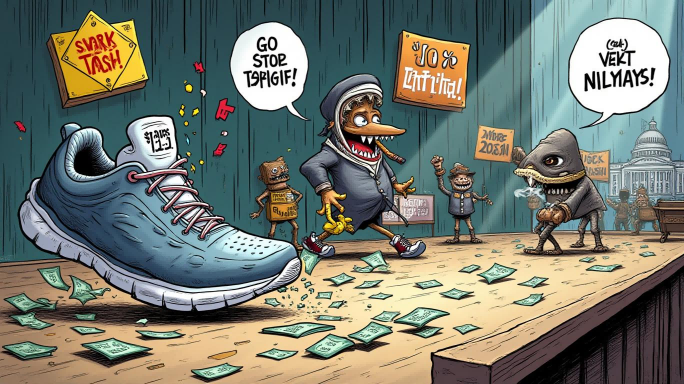AI MemeLab | SKECHERS Steps into the Private Realm: A Bold Move Amid Market Turbulence
On May 5th, SKECHERS, one of the world's top three athletic footwear retailers, announced its decision to go private in a surprising move. The announcement quickly became a trending topic on social media, reflecting the widespread interest and concern over the implications of this decision in the market.

SKECHERS has made a name for itself with its focus on comfort and affordability, breaking through in the global shoe market. The decision to go private signifies a strategic shift for the company amidst fluctuating market conditions, including the newly imposed tariff policies. Analysts suggest that SKECHERS might be aiming to sidestep the regulatory scrutiny faced by publicly traded companies, thus retaining greater operational autonomy as it navigates through these challenges.
The private equity firm 3G Capital, known for its investments in companies like Kraft HeinzKHC-- and Burger King, plans to acquire SKECHERS at $63 per share in cash. This transaction is expected to be completed in the third quarter and marks one of the most significant acquisitions in the footwear industry to date.
Upon completion, SKECHERS will delist from the New York Stock Exchange and operate as a private holding entity, albeit continuing under its existing leadership and strategic initiatives. These initiatives include the creation of innovative products, international market expansion, growing direct-to-consumer business, boosting U.S. wholesale business, and making strategic investments in global distribution networks, infrastructure, and technology.
Although SKECHERS posted a record sales figure of $2.41 billion for the first quarter of 2025, the growth was slightly below market expectations. The company's profitability is under pressure due to a low average selling price combined with decreased margins, reflecting the difficulties in absorbing increased tariffs. SKECHERS is not alone, as many other footwear companies are grappling with the same issue.
The company's sales growth has been mixed across geographies, with notable declines in the Asia-Pacific region, particularly China, where sales dropped by nearly 16% this past quarter. Given the strategic importance of the Chinese market to SKECHERS' growth objectives, the company has committed to increasing its investments in product development, marketing, and distribution infrastructure there.
The wider industry context also plays a crucial role. A coalition of 76 shoe companies, including SKECHERS, recently petitioned the White House to reconsider the current tariff policies, arguing that they pose a survival threat to the industry. These tariffs have left many companies unable to offset the increased costs, resulting in stagnant production orders and potential supply shortages in the U.S. market.
This move towards privatization could place SKECHERS in a more flexible position to adapt to these evolving challenges and position itself strategically for future growth, especially as it increases investments in key markets like China.
Turning market noise into visual signal.
Latest Articles
Stay ahead of the market.
Get curated U.S. market news, insights and key dates delivered to your inbox.



Comments
No comments yet